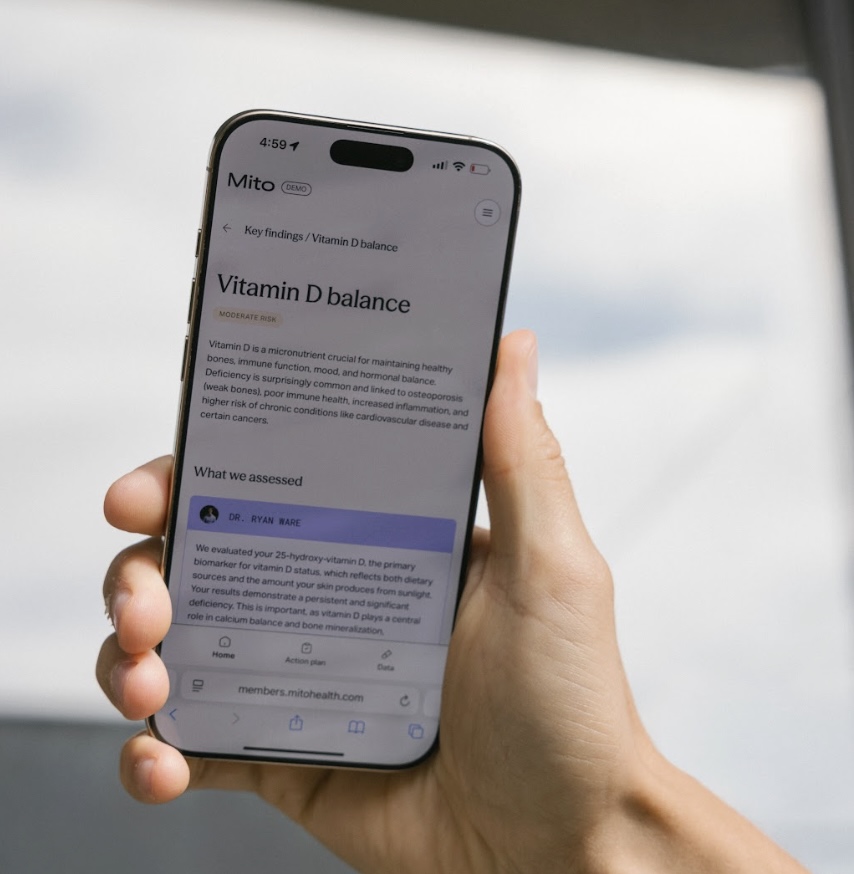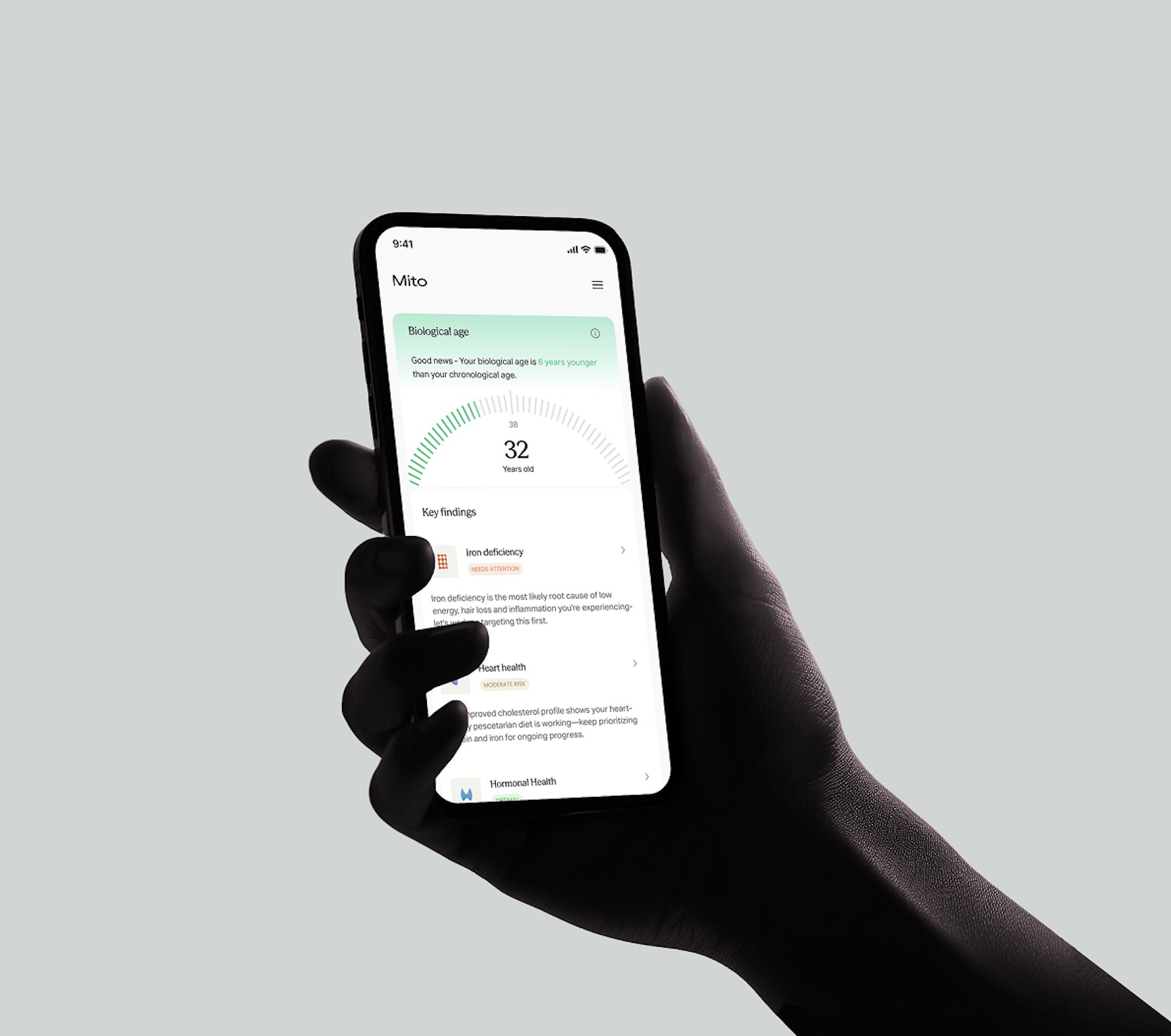In partnership with Mito Health. Editor’s Note: We only select and work with partners that meet our quality standards, so you can rest assured we only endorse products we believe in.
I am religious about my kids’ annual checkups, but when it comes to my own primary care, I tend to take a more “wait and see” approach. (Apologies to my dad, a retired physician, who is undoubtedly cringing right now.)
It’s not that I don’t care about my health. I do, I swear. It’s just that finding time to book an appointment, get lab work done, and then actually understand the results (and schedule any follow ups) always takes a back seat to my family’s immediate needs.
So when I heard about Mito Health, a personalized testing service that promises a 360° view of your health from one simple blood draw, I decided now was the time to finally lead by example and prioritize my own health. Mito Health makes it easy: with one blood draw, they analyze 100+ advanced biomarkers, measuring things like metabolic and hormonal imbalance to early indicators of heart disease, cancers, mood disorders and more.
What really convinced me to try it is that every patient gets a 1:1 virtual meeting with a member of their care team trained in functional medicine to discuss their personal results. No waiting rooms, no confusion and no lab reports to decipher with Dr. Google.
Here’s what happened when I gave Mito Health a try.
We like
- A mixture of AI and doctor analysis to provide personalized recommendations
- Action plan delivered and discussed during a virtual 1:1 meeting with a clinician
- Tests for 100+ biomarkers, which is 10x more than a traditional physical
- Easy-to-navigate personalized dashboard
- Convenient text message updates throughout the process
- HSA/FSA eligible in most states
We don't like
- Does not accept insurance
- Blood work appointments at the mercy of Quest Lab’s schedule but were plenty available in my zip code
How It Works
Given that Mito Health scans for early indicators of 1000+ conditions, I was expecting a lengthy and cumbersome sign-up process. I was totally wrong.
Before scheduling any blood work, Mito first asks patients to complete a health lab and profile, which consists of sharing your lifestyle related to sleep, exercise, health and diet, and any medications or supplements you take.
Questions are in short-answer form, which allows you to provide a bit more info than standard multiple choice options. It began by asking about my health concerns and goals, and what prompted me to seek out Mito. Each question was immediately followed by another relevant query.
For example, when I wrote that I hadn’t had a blood draw in years and I was seeking a baseline to understand my general wellbeing, Mito followed up with a prompt asking about my current lifestyle habits and supplements. There were about 4-5 questions, along with a quick family history intake form, which was all a walk in the park compared to the heaps of school forms and permission slips I’ve completed this school year alone.

It’s worth noting that this step is AI-driven, but unlike some of my Claude or ChatGPT threads, it felt personal and reflective of a convo I would have with an intake nurse at a GP.
Once I submitted my profile, I scheduled a blood draw at a local Quest lab. I appreciated that this was all done within the Mito dashboard and I wasn’t forced to create yet another login on the Quest website (hallelujah!). Mito partners with 2,000+ Quest labs across the nation so slots are usually available; if they’re not, you can always walk-in.
On the day of the blood draw, Mito asks that you fast for 8 hours beforehand. Luckily, I was able to snag a 7:40am appointment before school drop off, and because I had an appointment, I walked right in.
After confirming your name and date of birth, the blood draw itself is surprisingly fast. The phlebotomist takes roughly 12 blood specimens along with a urine sample. I was in and out in 15 minutes.
Mito texted me updates throughout the process like reminders of my upcoming lab appointment or notifying me that the preliminary results were in. Start to finish, the whole process from sign up to the lab appointment clocked in at under an hour.
More Than Your Typical Lab Report
Developed by leading researchers at MIT, Stanford, the Buck Institute for Aging and more, Mito aims to make high-level preventative care more accessible. Where a traditional physical might screen for a handful of biomarkers, Mito tests provide for 10x more. Their core panel looks at 100+ advanced biomarkers to detect early risks and build a personalized plan for better health and performance. Patients have the option to add on further advanced labs for an additional cost, including a gut microbiome test, heavy metals test, environmental allergy profile, sexual health screen and more.
Translation: Mito doesn’t just give you a lab report and send you on your merry way. They use a hybrid approach where AI meets real medical professionals. The platform’s algorithms analyze your results and family history, then licensed doctors review and translate the data into a personalized action plan.

Results appear in a sleek, user-friendly dashboard that’s refreshingly human. Each marker is categorized as “warning,” “borderline,” “acceptable,” or “optimal.” When I checked my HDL-cholesterol, for instance, I could instantly see that it was in the optimal range. Plus, they provided an explanation of what HDL-C is, what it assesses and what it means to have a high or low level. For someone who’s spent years Googling “what does this mean?” when trying to decipher lab results, this context was invaluable.
But, the analysis doesn’t stop there. Within 1-2 weeks, patients receive a final doctor-reviewed recommendation and a 1:1 virtual visit with a clinical expert. This last step is where Mito really stands apart. While other wellness brands hand you data, Mito helps you make sense of it, connecting the dots between your numbers, your habits, and your next steps.
Preventative Health Data, Simplified
Trying out Mito Health didn’t replace my annual physical, but it did something even more valuable: getting these personalized preventative insights motivated me to take a more proactive role in my own health.
Thanks to Mito, I’ll now be able to track my progress over time in a way that’s data- and expert-driven. And while a $349 test for the Core Lab (which Mito says would cost upwards of $15,000 through a traditional clinic), is not cheap, Mito does say that their service is HSA and FSA eligible in most states.
I appreciate that Mito delivers actionable, science-backed insights, paired with expert guidance that turns what could be confusing information into a pragmatic, easy-to-understanding plan. It’s a platform that’s equally suited for health enthusiasts chasing optimization and newcomers like me looking to finally make sense of their numbers and take a more proactive role in their wellbeing.



















